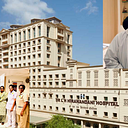How Hypertension Impacts Kidney Health: Causes, Symptoms, and Treatment
Did you know that hypertension can manifest itself in the form of Hypertensive kidney disease in Kidney patients? Believe it or not, the two are more interconnected than you’d believe. The kidneys have a significant role in maintaining blood pressure but when the kidneys can’t process and filter blood it puts immense pressure on the endothelium. The sustained high pressure within the blood vessels can strain the delicate blood vessels in the kidneys, further impairing their ability to function properly. This can result in reduced kidney function and an increased risk of developing kidney disease leading to hypertensive nephrosclerosis.
Understanding the Causes of Hypertensive Kidney Disease
Hypertensive kidney disease is primarily caused by chronic high blood pressure. When blood pressure remains consistently high, it puts excessive strain on the blood vessels in the kidneys, leading to damage over time. Hiranandani Hospital kidney care experts tell us that factors such as a family history of hypertension, unhealthy lifestyle habits, obesity, and certain preexisting medical conditions can aid hypertensive kidney disease development. By understanding the underlying causes, you can take proactive steps to manage your blood pressure and protect your kidney health.
Recognizing the Symptoms:
Detecting kidney problems related to hypertension can be challenging, as symptoms may not be evident until the condition has progressed. However, there are some common symptoms to be aware of, such as:
· changes in urination patterns
· increase in frequency or a decrease in output
· blood in the urine
· hand or foot edema (swelling)
There are some other underlying symptoms such as chronic fatigue, and trouble concentrating which go neglected due to their ‘commonness’. For a thorough check-up, it’s important to speak with a healthcare provider or expert, such as Dr. Sujit Chatterjee CEO Hiranandani Hospital, if you have any of these symptoms.
Complications of Hypertension on Kidney Function
When hypertension is left uncontrolled, it can lead to various complications that affect kidney function. One of the most common complications is the development of chronic kidney disease (CKD). Over time, the increased pressure within the blood vessels can cause damage to the tiny filtering units in the kidneys, known as nephrons. This damage impairs the kidneys’ ability to filter waste and excess fluid from the blood, leading to the accumulation of toxins and fluid retention in the body. Other complications may include kidney stones, kidney infections, and in severe cases, kidney failure.
Managing Hypertension to Protect Kidney Health
Proper management of hypertension is crucial for protecting kidney health. Prevention is always better than cure, and adopting a healthy lifestyle can go a long way in preventing hypertensive kidney damage. This includes:
1. Adopting a balanced and nutritious diet: For kidney patients to maintain a healthy kidney it is especially important to have a balanced diet rich in Vitamin B complex which boosts red blood cells, Vitamin C which maintains tissue health, and Vitamin D which keeps cells from oxidation. reducing sodium intake,
2. Engaging in regular physical Exercise: Maintaining a healthy weight and engaging in regular moderate aerobic exercise helps maintain kidney health. As per a study by the American Society of Nephrology, people with CKD who take part in regular exercise faced a 33% lower risk of their CKD developing into End Stage kidney disease (ESKD.)
3. Limiting alcohol consumption: We all know alcohol isn’t good for us but it’s not only bad for the liver but also for the kidneys. A study by American Kidney Foundation on 10,000 participants found that people who had one drink per day were twice as likely to develop ESKD.
Additionally, medication prescribed by a healthcare professional is necessary to help control blood pressure effectively. Along with managing blood pressure through regular monitoring and appropriate medication, it is essential to prioritize healthy habits. This includes following a balanced diet rich in fruits, vegetables, whole grains, and lean proteins, maintaining a healthy weight, staying physically active, avoiding smoking, limiting alcohol consumption, and managing stress effectively. By effectively managing hypertension, you can significantly reduce the risk of developing kidney problems.
Treatment Options for Hypertension-Related Kidney Disease
If hypertension-related kidney disease is unfortunately far beyond precautions, one can let a sigh of relief knowing various treatment options can help slow its progression and manage symptoms. Medications to control blood pressure, such as angiotensin-converting enzyme (ACE) inhibitors or angiotensin receptor blockers (ARBs), may be prescribed to patients and Hiranandani hospital kidney transplant experts also propose kidney transplant if the disease has reached End stage kidney disorder (ESKD). Additionally, dietary modifications, such as reducing protein and phosphorus intake, and maintaining adequate hydration, can help manage kidney disease. In some cases, advanced treatments like dialysis or kidney transplantation may be necessary for people with end-stage kidney disease.
Safeguarding Kidney Health by Managing Hypertension
To sum it up, hypertension can profoundly impact kidney health, but with proper management and lifestyle modifications, you can protect your kidneys and reduce the risk of complications. Regular monitoring of blood pressure, adopting healthy habits, and following a healthcare professional’s guidance are vital in preventing and managing hypertensive kidney disease. By taking proactive steps to control hypertension, you can ensure the well-being of your kidneys and overall health. Remember, your kidneys play a crucial role in keeping you healthy, so prioritize their care and consult with a healthcare professional for personalized guidance.
